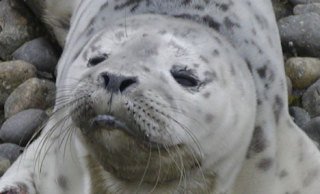They are cute, and their helpless cries for their mothers can make the hardest heart melt. But no matter how drawn you are to a seal pup, stay away.
That’s the warning from marine mammal experts now that seal pupping season has returned to Whidbey Island. The Central Puget Sound Marine Mammal Stranding Network is reminding residents and visitors to keep their distance from the animals so they have a better chance of survival.
Susan Berta of the network said it’s vital to stay away.
“It is important not to disturb seals on rocks or small islands such as Baby Island. Even approaching by kayak or foot is enough to cause all the seals to leave their resting spots and go back into the water,” Berta said.
Sometimes babies get seperated from their mothers in the general panic. And in some cases, the mothers don’t find or don’t take back their pups and the little guys are destined to starve.
The network has already responded to several seal pups in the area, and found most of them healthy and just needing to rest on the beach while mom is out catching lunch, Berta said.
Pups are born in the spring and summer and the timing of the peak birth period varies geographically, with pups in the San Juan Islands and eastern bays of Puget Sound born from late June through August and southern Puget Sound from mid-July through September.
The majority of pups are born at protected haul-out sites which are called rookeries, but a female may give birth anywhere that there is easy access to the waters edge.
So, even though Whidbey Island is a busy place, it’s not rare that a newborn seal calls Whidbey home.
“Seal pups can show up on any beach, but West Beach up by Oak Harbor is often a busy place because Smith Island, nearby, is a popular seal haul-out and breeding area,” Berta said.
“On the South End of the island, Baby Island is a popular place for seals to rest, often with their pups this time of year,” she added.
“There are also several seal haul-outs off the southwest side of Whidbey Island, but most of the haul-out areas around Whidbey are relatively small,” Berta said. Nursing pups remain with their mothers for about four to six weeks and then are weaned to forage and survive on their own. Up to 50 percent of the pups born will not survive the first year of life. Contributing factors can be disease or predators, but people are also to blame. Dehydration or starvation due to abandonment by the mother after a human touched the baby, or the separation of mom and baby, is a leading cause. Harbor seals are less mobile and therefore more vulnerable. Adult seals are more wary and escape to the water more quickly than pups. Females will flee to the water if approached and may leave their pups behind.
Reports indicate that pups have successfully reunited up to 48 hours after separation.
A female seal is likely to return to reclaim her pup once the disturbance near the pup goes away. But if activity continues near the pup, the female may eventually give up trying to return.
There are a few things people can do to keep the pups save.
• If you see a seal on the beach, give it room. The marine mammal viewing guidelines recommend a minimum approach distance of 100 yards. • Observe from a distance using binoculars or a spotting scope if you want to see the animal “close up.” • Keep pets away. Baby seals can easily fall prey to dogs. Older seals may bite in self defense. Dogs are naturally curious about other animals in their environment. To avoid a possibly interaction, dogs should be leashed and kept away from seals on the beach. And some diseases are infectious to both dogs and seals.
If you see a seal pup on the beach in Island County, contact the Central Puget Sound Marine Mammal Stranding Network at 1-866-ORCANET or 360-678-3765, and they will assess whether there is a need to send a volunteer out to post signs or observe the pup. For pups or strandings in other areas call National Marine Fisheries Service at 1-800-853-1964 or 206-526-6733.


